|
|
|
|
Leonard and Phil Chess, two Polish born immigrants, founded Chess Records the pre-eminent Blues label of the 50s and 60s. Eventually they created a monopoly of Chicago music recording, doing sessions and releasing recordings by every major blues performer from John Lee Hooker, Elmore James, "King of the Slide Guitar," to Bo Diddley through Jimmy Reed, Chuck Berry and everyone in between.
|
|
|
|
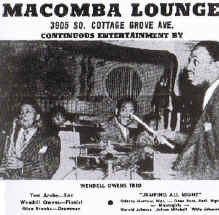
Brothers Phil and Leonard Chess owned the upscale Macamba.night club on Chicago's Southside. Chess Records "Home of the Electric Blues" was started by brothers Leonard and Phil Chess in the late forties. Leonard and Phil Chess - two enterprising immigrant brothers from Poland - bought into fledgling Aristocrat Records, a label that had been formed a short time before by Evelyn Aron and her husband.
|
|
|
By the time they got involved with Aristocrat, Leonard and Phil were already aware of what sort of music might sell in the Black community, that of a young Delta-born-and-bred slide guitarist: Muddy Waters. Waters had previously recorded for Columbia, the company but none of his work was released. When he recorded "Gypsy Woman" and "Little Anna Mae" for Aristocrat the Chess brothers found in him the means to distinguish their little company from the hundreds of other independent R&B labels springing up across the country.
|
|
At the beginning, Leonard and Phil focused their recording and publishing ventures primarily in the area of popular jazz, but soon expanded into blues, receiving their first Billboard recognition in 1947. By 1949 Aristocratic Records which became Chess Records in 1950, was a fixture in the world of music and its recordings and the songs published by Arc Music remain the most impressive collection of blues music in the world. From their experiences in the nightclub business on the South side of Chicago, the Chess brothers understood the popular preferences of their predominantly African-American audiences, but also saw the marketability of blues music to a broader audience. In the beginning Chess Records was ran as a two man business, with Phil overseeing the nightclub and the offices of Aristocrat/Chess and Arc, while Leonard alternately scouted talent, produced the sessions, and hand delivered fresh recordings to radio stations in the Chicago area.
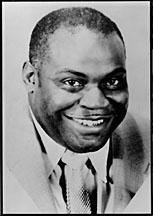
Slide guitarist Robert Nighthawk's pre-war popularity made him a nice acquisition, and the 1948 session that produced his "My Sweet Lovin' Woman" was doubly important because it introduced bassist Willie Dixon, an artist whose talent as a producer/songwriter/ session player during the 1950s and 1960s vastly contributed to the label's long-term success.
Willie Dixon was inducted into the Rock and Roll Hall of Fame in 1994 as an early influence.
|
|
In 1950, the Chess brothers launched Chess Records with Gene Ammons' "My Foolish Heart," followed by Waters' "Rollin' Stone." Guitarist Jimmy Rogers made his Chess debut August of 1950, with t "That's All Right" and "Luedella." Little Walter who revolutionized the role of the harmonica in Chicago blues with his astonishing flights of amplified fancy. Walter's legacy is punctuated by his slew of hits during the '50s: "Mean Old World," "Off The Wall," "You're So Fine," and the 1955 Dixon-penned R&B chart-topper, "My Babe."
Muddy Waters was inducted into the Rock and
Roll Hall of Fame in 1987.
Little Walter was inducted into the Rock and Roll
Hall of Fame in 2008
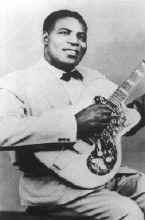
Despite his success with local talent, Leonard Chess, aided by Sam Phillips, began to look outside Chicago for talent. Phillips supervised Memphis pianist Roscoe Gordon's smash "Booted" (1952) and shipped Chess masters by Rufus Thomas, Dr. Isaiah Ross, Joe Hill Louis, and Bobby Bland, but his top contribution to the label's legacy was Chester Arthur Burnett, a.k.a. Howlin' Wolf. With Ike Turner playing the piano both sides of Wolf's first Phillips-produced Chess 78, "How Many More Years" and "Moanin' At Midnight," proved major sellers in 1951. By 1953, Wolf had left Memphis for Chicago, recording more hits including "Who Will Be Next" and "Smokestack Lightnin'."
Chester "Howlin' Wolf" Burnett was inducted into the Rock and Roll Hall of Fame in 1991 as an early influence.
|
|
|
A host of other blues legends recorded for Chess during the early and mid-1950s. Memphis Slim, Eddie Boyd and Willie Mabon, assuredly did. Boyd's 1953 "24 Hours" and "Third Degree" both sold very well, as did Mabon's "I Don't Know" (1952) and "I'm Mad" (1953), both number one R&B smashes.
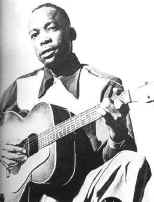
John Lee Hooker first recorded for Chess in 1950. Joe Williams made the charts that same year with "Every Day I Have The Blues." Big Bill Broonzy and Washboard Sam recorded material in '53 that straddled the fence between pre-war Chicago blues and the brasher new style.Memphis Minnie likewise attempted to resuscitate her career with a 1952 Checker single, "Me And My Chauffeur." On the jazzier side of the tracks, saxmen Leo Parker, Tab Smith, Lynn Hope, and Eddie Johnson kept things swinging. By the early-1950s, Water's group added pianist Otis Spann. Though he was now a star in his own right, Little Walter still recorded behind his ex-boss on Waters' immortal "I'm Your Hoochie Coochie Man" and "I'm Ready."
John Lee Hooker was inducted into the Rock and Roll Hall of Fame in 1991 as an early influence.

In 1955 new talent was added to the Chess stable. Sonny Boy Williamson, a blues legend across the Mississippi Delta thanks to his King Biscuit Time radio broadcasts, joined Checker, a Chess subsidiary label. For his first recording "Don't Start Me Talkin'" Chess paired him with most of Water's band. Bo Diddley was signed in 1955 too. His first two-sided smash for Checker, the self-titled "Bo Diddley" and "I'm A Man.

But no one at Chess had the impact on the
future of popular music that Chuck Berry did. Berry accepted
Water's advice regarding the advantages of working with
Leonard Chess, signing with the label in May of 1955 and his
first unforgettable hit, "Maybellene."
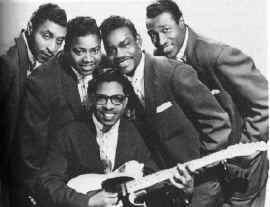
(l-r) Prentiss Barnes, Bobby
Lester, Alexander "Pete" Graves, Harvey Fuqua
Bottom: Guitarist Billy
Johnson
There were also vocal at Chess. Harvey Fuqua's the Moonglows from Louisville had a 1954 hit with "Sincerely," and The Flamingos, a Chicago quintet fronted by Nate Nelson, scored big for Checker in 1956 with their dreamy "I'll Be Home" and "A Kiss From Your Lips."

As Berry, Bo, and the vocal groups sold platters by the crates, some of the blues greats that had epitomized Chess during its early years of operation began to recede into the background. But mainstays Muddy, Sonny Boy, and Wolf hung tough, Wolf doing some of his best work during the early '60s when Dixon wrote "Back Door Man," "The Red Rooster," and "Hidden Charms" for him (the latter maniacally energized by Hubert Sumlin's elastic guitar work).

Buddy Guy
In 1960, Dixon recruited younger Chicago blues talent, signing guitarists Buddy Guy ("First Time I Met The Blues" and "Broken Hearted Blues") and Otis Rush(1960's "So Many Roads, So Many Trains")

Etta James also made her Chess debut in 1960, scoring no less than four hits for the imprint that year alone. Etta's magnificent work for Argo (and later Cadet and Chess) over the next 16 years uncovered depths of passion and pain barely hinted at on her previous waxings. She waxed the torch ballads "At Last" and "Trust In Me" (both major hits in 1961) surrounded by sumptuous strings, rocked the house with a gospel-rooted "Something's Got A Hold On Me" the next year, and set Muscle Shoals ablaze in '67 with her strutting "Tell Mama," sounding equally confident in all three diverse settings.
Etta James was inducted into the Rock and Roll Hall of Fame in 1992. as an early influence.
In 1962 Chess Records was sued by Peacock records for recording their artists Revered Robert Ballinger and Five Blind Boys of Mississippi.
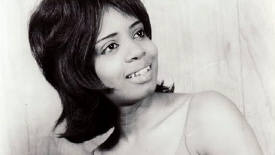
Fontella Bass
In addition to James had many female artists
during the mid-1960s that Jan Bradley ("Mama Didn't
Lie"), Sugar Pie De Santo ("Slip-In Mules"),
("I Had A Talk With My Man"), Fontella Bass
("Rescue Me"), Jackie Ross ("Selfish One"),
Jo Ann Garrett ("Stay By My Side"), Laura Lee
("Dirty Man"), and the Gems, whose precocious
membership included Minnie Riperton. Even Irma Thomas joined the
Chess in 1967, recording in Muscle Shoals. protégé Koko Taylor
scored the last Chicago blues hit for Checker in 1966 with her
growling "Wang Dang Doodle."
As rhythm and blues merged with gospel influences to form the
basis of soul, Chess was right on top of the trend. Little Milton
Campbell who had hits with "We're Gonna Make It,"
"Who's Cheating Who?" and "Grits Ain't
Groceries."
|
|
Along with Little Milton, were the Dells,
("There Is" and "Stay In My Corner") the
Radiants ("Voice Your Choice"), Billy Stewart
("Summertime," "Sitting In The Park"), Bobby
Moore & the Rhythm Aces ("Searching For My Love"),
Tony Clarke, James Phelps, and Bobby McClure.
Tommy Tucker's "Hi-Heel Sneakers," a huge '64 hit on
Checker, traveled bluesier terrain, while the Ramsey Lewis Trio,
with Eldee Young on bass and Red Holt on drums, turned out to be
a crossover sensation when their grooving instrumental remakes of
"The In Crowd" and "Hang On Sloopy" vaulted
up the R&B and pop charts in 1965. Nor was the Chess combine
deficient in humor - albums by veteran comics Moms Mabley and
Pigmeat "Here Comes The Judge" Markham made sure of
that.
Chuck Berry remained at Chess into 1966, seemingly rejuvenated
after serving a prison term (his 1964 hits included "No
Particular Place To Go" and "You Never Can Tell").
After unwisely switching to Mercury Records for a few lean years,
he returned home to Chess and scored his biggest pop hit of all
in 1972 with "My Ding-A-Ling." Bo Diddley recorded a
slew of Checker LPs throughout the decade, his trademark beat
never faltering.

So inspired by the magnificent output of Chess were the Rolling Stones that they immortalized the label's famous address, 2120 S. Michigan Avenue, in song on one of their early LPs.

L to R: Leonard, Marshall and Phil Chess
During this time, Muddy Waters and Howlin' Wolf
tried their best to cope with '60s trends. "Muddy Waters
Twist" was admittedly nothing to write home about, but his
'63 Folk Singer LP was a heartening return to his Delta roots,
and 1969's Fathers and Sons set united Muddy with adoring
disciples Mike Bloomfield and Paul Butterfield. Though at the
tail end of the decade producer Marshall Chess submerged Waters
and Wolf in a quagmire of psychedelia, each legend emerged with
his vaunted reputation intact.
In 1969, Leonard Chess died, still the heart and soul of Chess
Records. Earlier that year, he and Phil had sold the company to
GRT where producers Ralph Bass and Gene Barge tried their best to
hold things together. Sadly, though, the momentum that Chess had
long enjoyed quickly began to erode. In 1975, GRT closed down the
logo, selling it to All Platinum Records of Englewood, New
Jersey.
Finally, in 1985, MCA acquired the rights to the massive Chess
catalog. At the start of 1987, MCA Vice President of Catalog
Development & Special Markets A&R, Andy McKaie began to
mount an ambitious long-term reissue campaign of the invaluable
Chess masters - an ongoing program that rages full steam ahead
all year long in 1997 with the 50th anniversary celebration.
"The impact of Chess was far wider and greater than any of
the others, ranging from the impact of the Chicago blues sound,
the Chuck Berry/Bo Diddley school of rock & roll, and the
vocal group sounds," he continues. "The range of that
impact was so great that it's still being felt today.
Leonard Chess was inducted into the Rock and Roll
Hall of Fame in 1987
Save
America's Treasures: Chess Records & Recording Studio
![]()